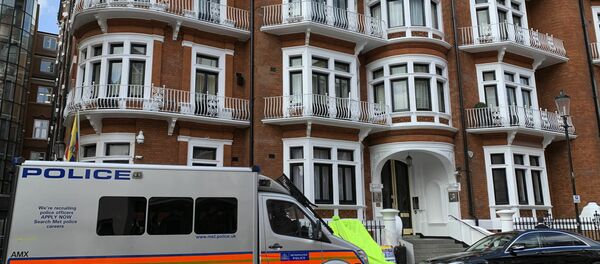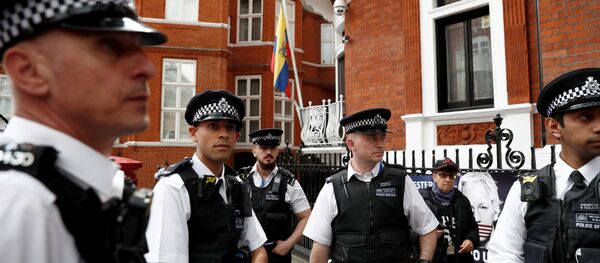WikiLeaks founder Julian Assange’s belongings, including legal papers, medical records and electronic equipment, left over from his time spent living with asylum status at the Ecuadorian embassy in London have been handed over to US prosecutors Monday, states WikiLeaks.
Press release: Ecuador hands over Assange's entire legal defense, manuscripts, to US prosecutorshttps://t.co/oEoe6g9xV9 pic.twitter.com/Fvdv8iWK0H
— WikiLeaks (@wikileaks) 20 мая 2019 г.
Earlier, WikiLeaks said UN officials and Assange’s lawyers were stopped from being present to witness the “ illegal seizure of property”, which has been requested by the US authorities.
Kristinn Hrafnsson, the editor-in-chief of WikiLeaks, said: “On Monday, Ecuador will perform a puppet show at the embassy of Ecuador in London for their masters in Washington, just in time to expand their extradition case before the UK deadline on 14 June. The Trump administration is inducing its allies to behave like it’s the wild west.”
Baltasar Garzón, the international legal coordinator for the defence of Assange and WikiLeaks, said:
“It is extremely worrying that Ecuador has proceeded with the search and seizure of property, documents, information and other material belonging to the defence of Julian Assange, which Ecuador arbitrarily confiscated, so that these can be handed over to the agent of political persecution against him, the United States.”
“It is an unprecedented attack on the rights of the defence, freedom of expression and access to information exposing massive human rights abuses and corruption. We call on international protection institutions to intervene to put a stop to this persecution.”
Assange's Ecuadorian lawyer Carlos Poveda told Sputnik the defence team for WikiLeaks founder Julian Assange will appeal a decision by Quito to hand over Assange's documents to Washington.
On Sunday, the newspaper El Pais reported that Ecuador would hand over to Washington Assange's mobile phones, computers, memory cards, and other data storage devices after searching the room where he used to reside.
The WikiLeaks founder was arrested in the UK capital on 11 April on the heels of Ecuador revoking his asylum status. The whistleblower was subsequently sentenced to 50 weeks in jail for jumping bail back in 2012, when he took refuge inside the Ecuadorian embassy in London to avoid extradition to Sweden over a sexual assault investigation that has since been dropped.
READ MORE: Swedish Prosecutors File Request for Assange's Detention Over Rape Inquiry
The US, seeking Assange's extradition on charges of conspiracy to commit computer intrusion, has to provide London with all the necessary documents on the issue by the 12 June deadline.
Assange's lawyers and supporters fear that he could be charged under the Espionage Act in the United States and face the death penalty.
READ MORE: Swedish Prosecutors File Request for Assange's Detention Over Rape Inquiry
Separately, Swedish prosecutors said on Monday that they had requested a district court in the Swedish city of Uppsala to issue a warrant for arresting WikiLeaks founder Julian Assange in absentia. The announcement came a week after Sweden had reopened an inquiry into 2010 rape allegations, two years after a preliminary probe into the claims was closed.
'Some Nations Prepared to Bend Their Legal Systems to US Demands'
Greg Barns, a prominent barrister and adviser to the Assange Australian campaign, has commented on the matter, saying that Assange's case is "showing that there are some nations prepared to bend their legal systems to Washington's demands, while Ecuador's and Sweden's conduct falls into this category.
"In the case of Ecuador, it is prepared to breach international law to allow the US to seize property which should be protected by Ecuador and given back to Assange. Sweden has closed its Assange file twice but reopens it because the US tells it to do that. Its selling out it's legal system," the adviser claimed.
Israel Shamir, a political analyst and expert on WikiLeaks, has also slammed Ecuador's move as "an obvious betrayal of Julian Assange’s trust in the country."
"Julian trusted them and stayed for a while in their London embassy, and, to add insult to injury, they didn’t just give him up to UK police, they’ve also now given his personal belongings to the United States. Their betrayal is awful and truly regrettable."
As for Sweden’s decision to seek the extradition of Assange, he said that "this move would also be a very bad and upsetting development."
"In the very beginning of this sad story, the [general] attorney in Sweden released Assange from all accusations and allowed him to leave for England. But since then there’s been strong pressure on the UK suggesting that the Swedes would renew their demand for extradition and apparently, they have done so again. In short, Sweden decided to submit to British and American demands to imprison Assange."
"And after that he will probably be deported to the United States to stand trial and, probably, remain in jail forever. That seems to be a very bad and, obviously, very sad result for the brave and courageous truth-seeker," he concluded.
The views and opinions expressed in this article by Greg Barns and Israel Shamir are solely those of the speakers and do not necessarily reflect Sputnik's position.





